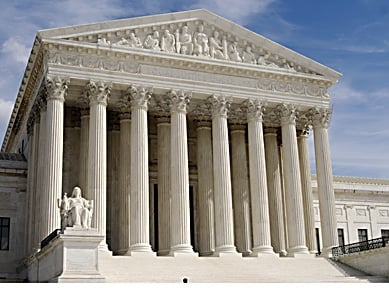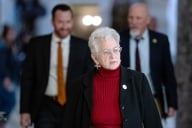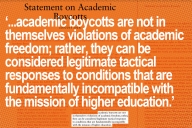You have /5 articles left.
Sign up for a free account or log in.

U.S. Supreme Court
WASHINGTON -- The U.S. Supreme Court ruled unanimously Thursday that a community college employee who testified about an Alabama legislator's no-show job had First Amendment protection when he did so. The ruling allows the employee -- whose job was subsequently eliminated -- to pursue a claim that he lost his position in retaliation for his testimony.
Lower courts had ruled that the employee had no First Amendment protection in such a circumstance. The ruling clarifies that community college employees (and public employees generally) do have First Amendment protection when testifying truthfully under oath. While that is a relatively narrow circumstance in the range of all speech by public college and university employees, advocates for faculty free speech rights were still cheered by the decision. They said any affirmation of public employees' free speech rights is a good thing, and noted some parts of the decision that reaffirmed rights specific to college and university faculty members.
"It would be antithetical to our jurisprudence to conclude that the very kind of speech necessary to prosecute corruption by public officials -- speech by public employees regarding information learned through their employment -- may never form the basis for a First Amendment retaliation claim," wrote Justice Sonia Sotomayor in the court's decision. "Such a rule would place public employees who witness corruption in an impossible position, torn between the obligation to testify truthfully and the desire to avoid retaliation and keep their jobs."
The ruling came in a lawsuit by Edward Lane, who in 2006 was hired to be director of the Community Intensive Training for Youth program, operated by Central Alabama Community College. Lane found that Suzanne Schmitz, a state legislator, had a no-show job. Against the advice of his superiors, he pushed her to start showing up for work and, when she didn't, he fired her.
Federal authorities indicted Schmitz for mail fraud and theft related to the use of federal funds, and Lane testified against her in a trial in which she was convicted and sentenced to 30 months in prison. Subsequently, the college eliminated the jobs of Lane and a few dozen other employees of the program he led, but then restored the jobs of all but three of the employees (Lane being one of them). He sued, arguing that he had lost his job in retaliation for exercising his First Amendment rights to testify (and to do so truthfully) in Schmitz's trial.
Lane's suit was thrown out, without a ruling on its merits, by a federal district court and an appeals court. Both courts cited the Supreme Court's 2006 decision in Garcetti v. Ceballos, which found that public employees engaged in speech related to their official duties do not have the same First Amendment protections that apply to others. That decision involved a dispute in the Los Angeles district attorney's office and the extent of its applicability to public higher education has been much debated (primarily with regard to faculty speech). In applying Garcetti to Lane's suit, the lower courts ruled that he had no right against retaliation because he was testifying about matters he learned about in connection with his job at the community college.
Justice Sotomayor's decision, however, said that Garcetti should not apply in a case where the speech directly relates to matters of public concern and the duties of a citizen. "[P]ublic employees do not renounce their citizenship when they accept employment," she wrote. "Truthful testimony under oath by a public employee outside the scope of his ordinary job duties is speech as a citizen for First Amendment purposes. That is so even when the testimony relates to his public employment or concerns information learned during that employment."
Several public sector unions -- including the National Education Association -- filed briefs in the case, backing Lane. The NEA brief said that it believes that when public education employees give sworn testimony, that testimony should never be the "basis for any adverse employment action."
Aaron Nisenson, senior counsel for the American Association of University Professors, said he viewed the decision positively in that it noted that speech of public employees shouldn't simply be deemed to lack First Amendment protection because it relates to job duties. "The fact that the employee gained the information from his or her employment does not render the speech unprotected," he said. "This expands the rights of employees at public institutions."
Robert O’Neil, former president and professor of law at the University of Virginia, and an expert on faculty free speech issues, said via email that although Thursday's decision involved a community college administrator, the non-academic nature of the speech in question didn't offer great support for faculty members who do not want Garcetti applied to their speech.
But O'Neil said that professors should be pleased that -- in a unanimous decision -- the Supreme Court cited its Keyishian ruling, which in 1967 found that state education agencies could not bar the hiring of employees for being members of the Communist Party. "Simply by invoking with strong approval" that ruling, O'Neil said, the Supreme Court was taking a stand for academic freedom.
Justice Sotomayor cited that decision to say that "this court has cautioned time and again that public employers may not condition employment on the relinquishment of constitutional rights."








